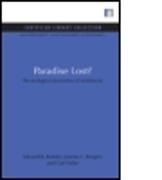Read more
Our well being--even our existence--depends on ecological systems and biological diversity. Ecologists and economists alike recognise that loss of biodiversity is one of the most serious problems the world faces yet their narrow, conventional approaches often fail to grasp all the implications of the problem. New, interdisciplinary thinking is required to safeguard both us and the biosphere from the effects of species extinction.
List of contents
Preface 1. Background and Overview Part1: Implications, Driving forces and perspectives 2. Ecological and Economic Implications of Biodiversity 3. Ecological and Economic Perspectives: Convergence or Divergence? 4. Driving Forces for Biodiversity Loss Proximate and Underlying Causes Part2: Analysis of Selected Systems 5. Forests 6. Wetlands 7. Estuarine and Marine Ecosystems 8. Rangelands Part3: Lessons for Management and Policy 9. Instruments and Tools for Biodiversity 10. Policies and Institutions for Biodiversity Conservation International Management and Incentives Part4:Conclusions 11. Paradise Regained: The Challenges Ahead
Summary
Our wellbeing-even our existence-depends on ecological systems and biological diversity. Ecologists and economists alike recognise that loss of biodiversity is one of the most serious problems the world faces yet their narrow, conventional approaches often fail to grasp all the implications of the problem. New, interdisciplinary thinking is required to safeguard both us and the biosphere from the effects of species extinction. Paradise Lost, the outcome of a unique collaboration between economists and ecologists initiated by the Beijer Institute of the Royal Swedish Academy of Sciences, shows how an integrated approach can understand and tackle the issue: Part1 provides an overview of the causes of the problem, and of previous approaches to dealing with it; Part 2examines the effects of biodiversity loss on specific natural systems and the limits to our current knowledge; Part 3looks at the policy implications discussing the ecological limits to economic activity and the management institutions needed to make an integrated approach effective and Part4 presents the conclusions: the future research needed and the policy challenges which have to be confronted. Stimulating and clearly written, this book provides a comprehensive account for those academically or professionally involved, and for anyone wanting to know what is at stake and what can be done.

